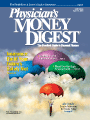PRN: Money, Money, Money
In our developing series on "Things WeTake For Granted in Our FinancialSystem," surely no entry has a greaterplace of honor than money itself. Call itcash, dough, moolah, bread, dead presidents,or whatever, we handle it everyday and speak of it every day with narya second thought. And that is a goodthing, as we will see.
Cotton Mather, our witch-burningforbearer, called money simply civilization,for it is a measure of value, a mediumof exchange, a symbol of power,and a sign of legitimacy. But if you thinkabout it, money is really just numbers,regulations, and—the key characteristic—a shared belief in the whole concept.That is to say, we have a mutuallyshared assumption and trust that all willhonor the greenback when presentedfor trade. After all, as has so often beensaid, it's just paper.
VIRTUAL CURRENCY
Deeper investigation will give us thesharp realization that money often isn'teven currency. Of the $7 trillion or soaround the world, only about $667 billionis actually cash, and two thirds ofthe 22 billion notes printed are in theUnited States; the rest are floating overseas.Most of our money is in computers,and comprise an obligation to pay, ortransfer numbers within a carefullydefined system of rules and safeguards.It's fast, it's easy, and helps speed up thepace of the economic engine that governsour lives. Just imagine how everythingwould slow down and the qualityof our lives would be affected if we hadto carry around a thick wad of bills forall economic activity. Worse still, imaginerelying on the prior system of subsistence,bartering.
So, in the 21st century, most currencies,certainly most dollars, havealready become virtual. In effect,money exists in the quantity, power,and utility that it does largely becausewe need it to, and have agreed that itdoes. Money is an essential grease ofthe social contract, as Mather said.
FICKLE FIGURES
You could even argue that inflationand deflation, the cyclical assaults onthe value of money itself, is an expressionof the mood of the people as theyassess the state of the economy incommon, tangible, numeric form. If Ithink things are booming and demandoutstrips supply, then my bucks areworth less. If the economy is in thetank, my dollars will buy more andthus become more valuable.
Greenback
Jason Goodwin, the author of (Henry Holt & Co, Inc;2003), while giving us a ripping goodread of the checkered history of thedollar's past, makes some interestingpredictions. Because of the virtualizationof money via credit cards anddebit cards, in the near future, theonly people who will actually handlecurrency will be paupers. The rest of usmay come to be like Queen Elizabeth,who famously never had to handlemoney at all. For most of us, the sameeffect will be achieved for very differentreasons. So, if you've decided to goall modern, all electronic, or no longertrust those pesky paper bills, as a publicservice, I will be happy to dispose ofany you care to send to me, care ofi>Physician's Money Digest.
Jeff Brown, a partner on theStanford Graduate School ofBusiness Alumni ConsultingTeam, teaches in the StanfordSchool of Medicine FamilyPractice Program. He welcomes questionsor comments at jeffebrownmd@aol.com.
